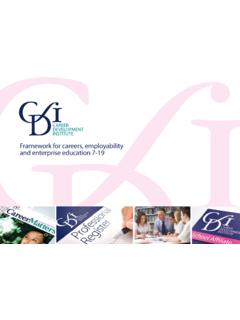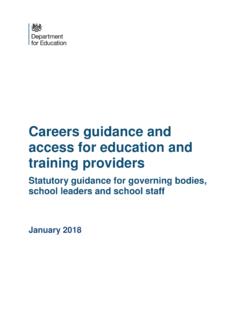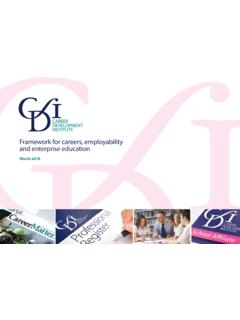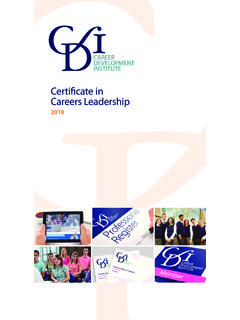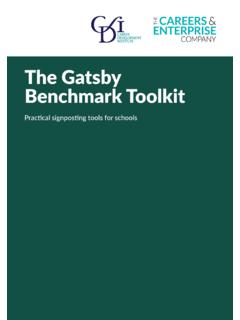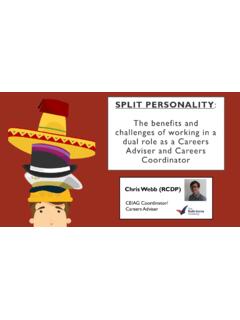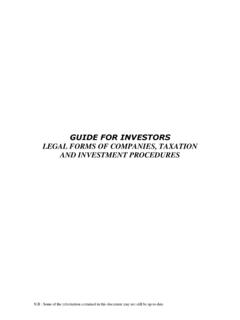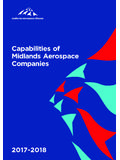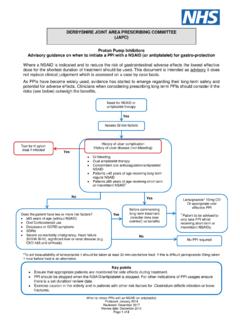Transcription of Unit aim and purpose - thecdi.net
1 OCR 2013 1 Unit Title: Lead and manage career development work in an organisation OCR unit number: 21 Level: 6 Credit value: 9 Guided learning hours: 60 Unit reference number: Y/505/2625 Unit aim and purpose This unit aims to develop the learner s critical understanding of the leadership and management of career development work in an educational or training institution, such as a school, college, work-based training provider or university, or in a business setting or employing organisation, and to enable the learner to lead and manage career development work in such organisations Learning Outcomes Assessment Criteria Teaching Content The Learner will: 1 Understand models for the role of career development leader in an organisation The Learner can: Explain how the principles of leadership, line management and project management can be applied to career development work in own organisation Critically analyse a range of models for the role of career development leader Justify a model for effective leadership of career development work in own organisation Examining the full range of tasks involved in leading and managing career development work in an organisation ( advising senior leaders on policy, priorities and resources; managing provision of IAG.)
2 Planning and ensuring effective delivery of careers education) Examining the roles of the range of individuals and organisations with which a careers leader needs to work from both within and from outside own organisation, and the relationship to own role Examining the advantages and disadvantages of different models for organising the role of careers leader within the management structure of own organisation ( single role of careers leader; sharing functions among several middle leaders; part of a larger, senior leadership role) 2 OCR 2013 Learning Outcomes Assessment Criteria Teaching Content 2 Be able to promote career development work within an organisation Explain the value and impact of career development work Secure support for career development work from senior leaders and managers within own organisation Communicate the benefits of career development work clearly within own organisation Accessing and utilising relevant research studies and inspection reports Preparing review and development plans for career development work Providing written briefings and/or oral presentations for senior leaders.
3 Governors and staff colleagues 3 Be able to work with senior leaders to develop policy for career development work Critically review current policy, and develop policy proposals, for career development work, with a commentary justifying such proposals Advise senior leaders and managers on policy, priorities and resources for career development work Keeping under review and developing policy statements Preparing reports and proposals for senior leaders 4 Be able to plan the overall programme of career development work within an organisation Plan the overall programme of career development work, in consultation with others Justify how the various components of the programme of career development work form a coherent whole Working with colleagues from both within own organisation and from external agencies to plan an overall programme of career development work 5 Be able to manage colleagues and resources in order to deliver career development work Devolve responsibilities and delegate tasks to colleagues involved in career development work.
4 Justifying the decisions taken Maintain an overview of colleagues and resources used in the delivery of career development work Monitor and support staff in the delivery of career development work Line management and project management of individuals and teams of colleagues delivering components of the overall programme Understanding the range of resources needed to deliver career development work ( curriculum time, teaching and learning materials, IT equipment, accommodation, time, etc.) Monitoring and supporting OCR 2013 3 Learning Outcomes Assessment Criteria Teaching Content Prepare and account for budgets for career development work members of staff delivering elements of the career development work Overseeing the work of the careers support assistant, or drafting a job description for such a role Preparing and accounting for annual career budget 6 Be able to manage effective partnerships to deliver career development work Explain the principles of partnership working, negotiating agreements.
5 Commissioning and contract monitoring in relation to career development work Justify the partnership arrangements required for effective career development work in own organisation Develop and maintain partnerships with other departments within own organisation Working with senior leaders to commission career guidance services from external providers identifying needs, specifying services, negotiating and monitoring contract Securing support for career development work from other departments and teams within own organisation 7 Be able to commission careers guidance services for an organisation Negotiate agreements and secure contracts with relevant partners including career development service providers, and keep such arrangements under review Range of career development service providers Preparing a service specification Questions to ask of potential providers Assessment This unit is centre-assessed and externally verified.
6 In order to achieve the unit the learner must produce a portfolio of evidence drawn from the workplace and which will need to be made available to the external verifier Evidence requirements In order to achieve this unit, learners must demonstrate that they have met all of the stated learning outcomes and assessment criteria. All of the evidence must be generated in the workplace. Portfolios of work must be produced independently and centres must be able to 4 OCR 2013 confirm that the evidence is authentic. Guidance on assessment and evidence requirements Learners should consult their assessor to agree the most appropriate sources of evidence available in their working environment. Examples of possible sources of evidence are listed below but this list is not definitive or exhaustive and nor are any of the examples mandatory.
7 Job description/Role specification with commentary Organisational structure with commentary Reports and papers written for senior leaders Review and development plans Examples of briefings and presentations Policy statements Overall programmes of career development work Minutes of meetings with colleagues and own networks Reflective log or journal Performance management records Budget statements Contracts with external providers You should refer to the Admin Guide: Vocational Qualifications (A850) for Notes on Preventing Computer-Assisted Malpractice. National Occupational Standards (NOS) mapping/signposting The mapping in the table below provides an indication of where evidence might be available for assessment against some of the knowledge and understanding contained in the national occupational standards (NOS).
8 It does not claim to guarantee that evidence will meet the NOS. NOS can viewed on the relevant Sector Skills Council s website or the Occupational standards directory at Occupational standards Unit number Title The NOS for Career Development do not currently cover leading and managing career development work in an organisation but this unit does relate to Functional Competency F6 of the Competency Framework for the Career Development Sector developed by the Careers Professional Alliance and adopted by the Career Development Institute (CDI). Functional skills signposting This section indicates where candidates may have an opportunity to develop their functional skills. Functional Skills Standards English Mathematics ICT Speaking and Listening Representing Use ICT systems OCR 2013 5 Reading Analysing Find and select information Writing Interpreting Develop, present and communicate information Resources Andrews, D.
9 (2004) Leading and Managing Careers Work in Schools: the changing role of the careers co-ordinator NICEC Briefing Cambridge: NICEC Andrews, D. (2011) Careers Education in Schools Stafford: Highflyers Publishing Barnes, A., Bassot, B. and Chant, A. (2011) An Introduction to Career Learning and Development 11-19: Perspectives, Practice and Possibilities London: Routledge Edwards, A. and Barnes, A. (1997) Effective Careers Education and Guidance Stafford :Network Educational Press Law, B. (1996). Developing careers programmes in organisations , in Watts, , Law, B., Killeen, J., Kidd, & Hawthorn, R. Rethinking careers education and guidance: Theory, policy and practice. London: Routledge. LSIS (2009). Career learning for the 21st century: a leadership issue for the FE sector.
10 LSIS (2010). Career learning for the 21st century: Embedding CLIAG a guide for leaders. McCrone, T., Marshall, H., White, K., Reed, F., Morris, M., Andrews, D. and Barnes, A. (2009) Careers Coordinators in Schools Research Report DCSF-RR Additional information For further information regarding administration for this qualification, please refer to the OCR document Admin Guide: Vocational Qualifications (A850) on the OCR website.

